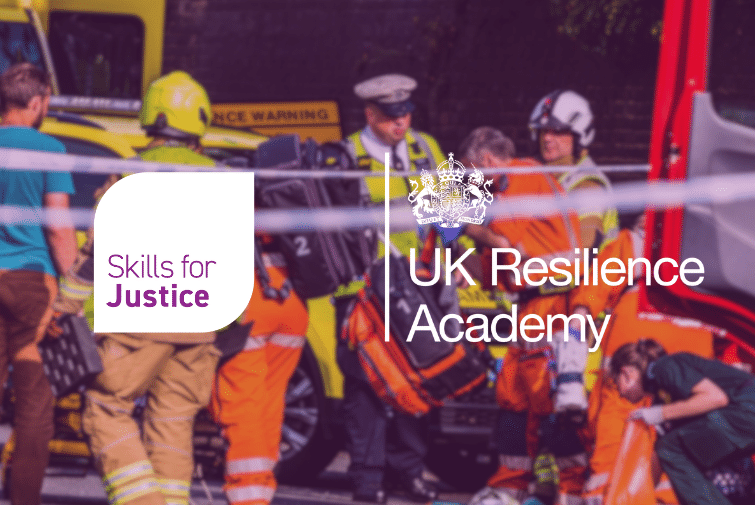Published by Skills for Justice
National Occupational Standards
Resilience and Emergencies National Occupational Standards launched
Date 29.04.25

A new set of National Occupational Standards (NOS) for Resilience and Emergencies have been published by standard setting organisation The Workforce Development Trust (parent group to Skills for Justice) as an initiative of the UK’s Cabinet Office.
NOS are definitions of the core and transferable skills utilised by employers and qualifications bodies to support competency and capacity building in a range of different areas.
Aligned with the launch of the UK Resilience Academy (UKRA), the NOS for Resilience and Emergencies have been developed to strengthen organisational and societal resilience to known and unknown threats, such as climate change or a COVID-19-style pandemic for example, and enable business, government and civil society to better withstand and quickly recover from a crisis.
Experts in resilience and emergency planning and preparedness from across central and local government, civil society, the NHS and operators of key strategic infrastructure led the project to design the NOS. Now published, it is intended that the NOS for Resilience and Emergencies will guide recruitment, training and skills needs analysis and performance management activities in organisations with statutory and non-statutory responsibilities for emergency planning and disaster preparedness.
Hamish Cormack, Head of UKRA comments:
“NOS provide an employer-led, multi-sector definition of competence, setting the standards which govern and quality assure skills and skills development across the UK.
“The NOS for Resilience and Emergencies are a significant step forward in terms of supporting a UK-wide approach to resilience and emergency preparedness, providing the foundations for building skills capacity across our nations and regions to mitigate the risks posed by a range of disruptive challenges.”
John Rogers is Chief Executive of The Workforce Development Trust – a charity and standard setting organisation that is responsible for the development and review of the NOS for Resilience and Emergencies. He comments:
“In a complex and uncertain world, it is paramount that society as a collective takes action to strengthen the nation’s resilience to new and emerging threats, protecting the health and security of our communities.
“Strengthening our resilience requires business, government and civil society to work together to develop the shared capabilities and capacity to re-think, re-adjust and re-align in the face of rapid change.
“Skills and skills development are integral to this, and so the NOS for Resilience and Emergencies provide a robust resource and common language to support employers and qualifications bodies to work in alignment with one another to achieve this goal.”
Dave Walton, Deputy Chief Fire Officer at West Yorkshire Fire and Rescue Service, comments:
“What resilience looks like is different for every organisation, however, meaning that the NOS gives everyone a baseline to work from in terms of ensuring emergency response is as effective as it as possibly can be.
“The Resilience and Emergencies NOS will therefore be vital for supporting interoperability and interoperability in fire and rescue and the wider emergency services, providing recognised standards we can all train our staff towards.”
The NOS for Resilience and Emergencies contain 11 separate standards, which can be used alongside a series of generic NOS supporting areas such as management, project management, governance and IT. Together, the standards are intended to be used for developing skills and knowledge via direct transfer into vocational and other qualifications, to underpin training programmes and job descriptions and as measures of workplace competence.
NOS are recognised by the Scottish Qualifications Authority, Qualifications Wales and the Council for the Curriculum, Examinations and Assessment in Northern Ireland. In England, NOS are part of the Regulated Qualifications Framework which regulates general and vocational qualifications.




